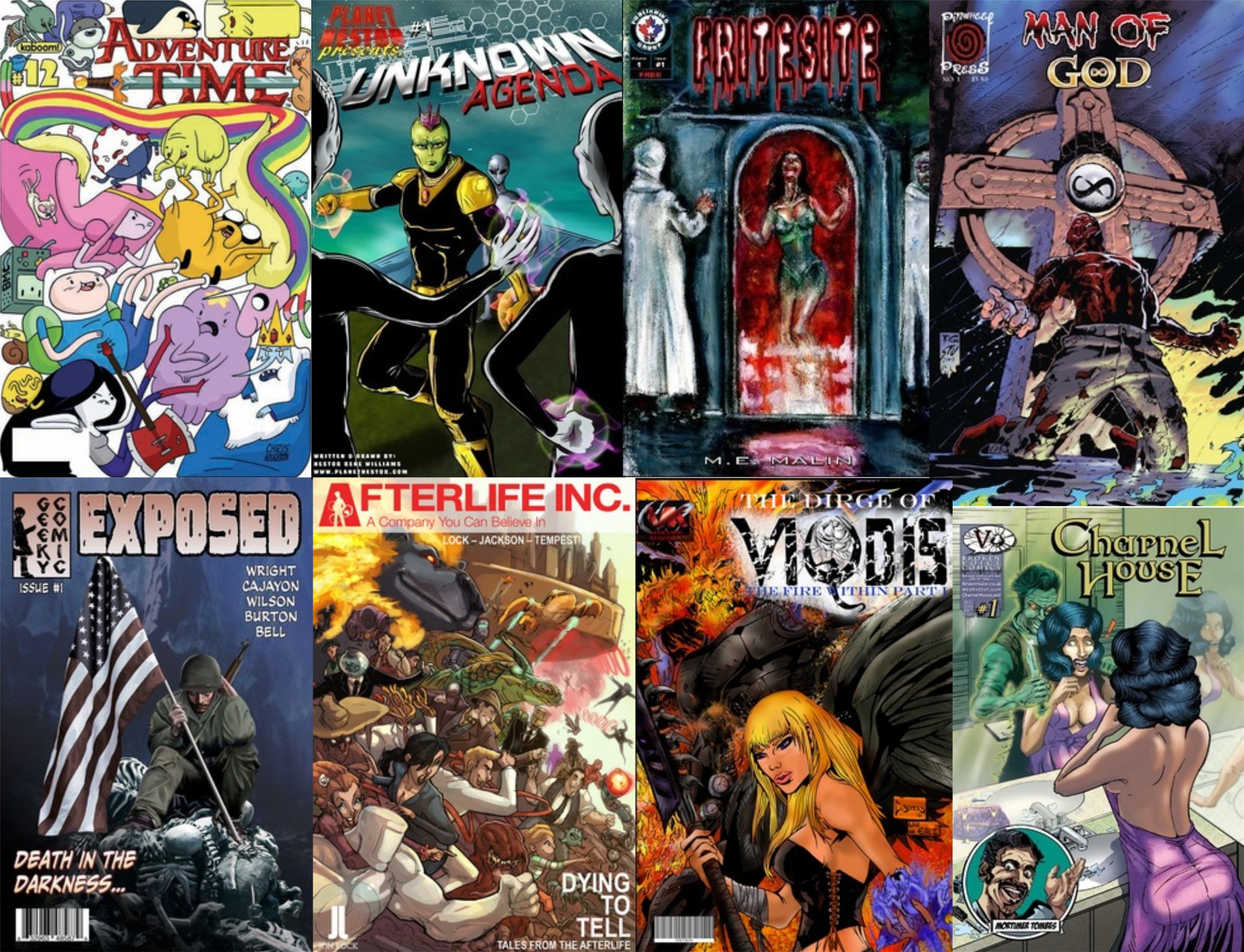From his first title The Codex being successfully funded on Kickstarter back in February to his upcoming Mad Cave Studios title Missing On The Moon due out in December, this is Cory Crater. The latest to join us in the Mind Meld! So with that said, let’s get to it!
1. Hello there, and welcome to the Mind Meld here at IndieComiX! For those who may not be aware of you and what it is you do, could you tell us a bit about yourself?
Hi! I’m Cory Crater, the writer of Missing on the Moon, a mystery thriller set in an alternate version of the 1990s. The story takes place in a world where the Soviets won the space race, established colonies on the moon, and eventually collapsed, leaving the United States to take over. It’s my first published story, outside a graphic novel I wrote and Kickstarted called The Codex. Outside of that, most of my writing and creative work comes from my career on YouTube over the past fifteen years.
2. Missing On The Moon, your second work to be published after The Codex, a graphic novel that was successfully funded on Kickstarter last year, what can you tell us about it?
Missing on the Moon takes readers into a dystopian lunar colony where the collapse of the Soviet Union left behind the Darksiders—oppressed Soviet colonists forced to the edge of survival. The story delves into a dangerous drug called Stardust that zombifies its users, government coverups tied to child disappearances, and a tense struggle between those in power and those left behind. All told, there’s a lot of story packed into these four issues.
3. Missing On The Moon is being published through Mad Cave Studios, what led to you and the book getting on their radar?
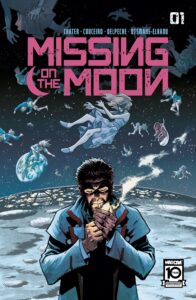 Damian introduced me to the team at Mad Cave Studios, and we quickly found ourselves on the same page about the story. I wanted to create something familiar but with a fresh twist—grungy 90s retrofuturism set in a dystopian, very much lived-in world. It felt like something special to us, and I hope readers will feel the same.
Damian introduced me to the team at Mad Cave Studios, and we quickly found ourselves on the same page about the story. I wanted to create something familiar but with a fresh twist—grungy 90s retrofuturism set in a dystopian, very much lived-in world. It felt like something special to us, and I hope readers will feel the same.
4. Damian Couceiro, Patricio Delpeche, and Hassan Otsmane-Elhaou are a part of your creative team for MOTM, what led to you getting them on board?
I’m thankful that Damian introduced me to Patricio and Hassan. The vast majority of what makes this series so special is the talented team of the artists behind it. Damian packs each panel with incredible detail, creating this immersive, lived-in world. Patricio has an amazing eye for color, perfectly combining the gritty noir elements with vibrant, complementary colors that make each page pop. And Hassan’s lettering is phenomenal. He has this raw, unique style that ties everything together. The cohesiveness of their work is undeniable, and it elevates the story in ways I couldn’t have imagined.
5. Given the setting is a colonized Moon in the late 1990s, what inspired you for that setting?
I feel like a lot of media in the last decade has been heavily focused on the 80s, and having grown up in the 90s and early 2000s, I wanted to capture some of the mystique of life before iPhones—when life consisted of clunky computers, Blockbuster rentals, and ordering pizza on the landline. I was also inspired by the works of H.G. Wells, Isaac Asimov, and Robert Heinlein, along with other great sci-fi writers who shaped my love for the genre.
6. Private Eye characters are typically likable but Daniel Schwinn? Not so much for me at least. Was that done intentionally?
Thank you for saying that. Daniel Schwinn is very intentionally a bad cop. As we’ve seen increasingly come to light in recent years, there are plenty of bad cops out there, and I wanted to explore that. Schwinn is morally stunted—some might even say irredeemable. The narrative is told through his perspective, and he sees himself as the introspective cop tackling a tough case. But as the story progresses, it becomes clear that his inner monologue doesn’t reflect reality—it reflects his willful ignorance and the lies he tells himself to avoid accountability.
7. When MOTM is wrapped up, what project will readers see you on next?
The Codex Volume II is almost finished, clocking in at nearly 200 pages, so I’m planning a Kickstarter for that—hopefully in early 2025. Beyond that, I have a few other projects outlined that I’m itching to dive into. I’ve already talked with Patricio and Hassan about collaborating on a future series. Time will tell, but my hope is that MOTM is just the start of my comics journey.
8. For that matter, will MOTM be the only Mad Cave title from you? Or can we expect to see more from you through the Cave?
I’ve been bouncing some ideas around with our editor, Christina, and I’m in the process of outlining a few series to see if we align on any of them. I have a handful of series I’ve been dying to explore. Not to mention, if MOTM resonates with readers, I’d be open to exploring prequel or sequel material—or even a Missing anthology of sorts. I’m always up for writing something creative, and I’d be thrilled to continue collaborating with Mad Cave.
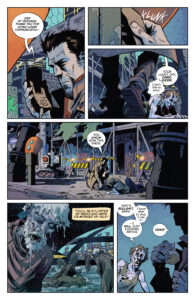 9. When it comes to print vs. digital, where do you land on the debate?
9. When it comes to print vs. digital, where do you land on the debate?
Whatever floats your boat! Personally, I love holding a comic, novel, or any kind of print in my hands. There’s something special about turning the pages. That said, I think supporting your local comic shop is so important—it strengthens the community and helps bring more amazing projects to life. Whether it’s print or digital, showing up and engaging with the stories you love makes all the difference.
10. Your thoughts on AI?
It’s a complicated issue. I don’t support art made with AI. I can’t draw to save my life, but I deeply respect those who can, and I believe their talents and intellectual property need to be protected. That said, I do use AI as a tool to review my writing. I don’t use it for ideation, or have it do the creative writing for me–that would go against the point. However, it is helpful for fixing awkward wording and even pointing out plot holes or flaws in a story’s structure. Like any tool, it’s all about how you use it responsibly. If you use AI to write your story, you’ll end up with something pretty flat that lacks originality and, most importantly, authenticity.
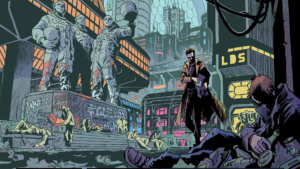 11. As The Codex is available to currently only buy through Kickstarter, do you plan to sell it through other platforms as well?
11. As The Codex is available to currently only buy through Kickstarter, do you plan to sell it through other platforms as well?
I actually have a website where I sell copies: hayburnerstudios.com. They come straight from the stack of boxes in my closet, so it’s a real grassroots effort! I’ll also be selling Volume I alongside Volume II when that launches early next year. I’d love to eventually sell it through other platforms or even team up with a publisher to get a wider distribution going. I outlined 1,000 pages of this story—it’s my real attempt at a magnum opus, and there’s so much left to tell. This project is incredibly close to my heart, and I hope to see it through to the end.
12. Given we can clearly see life on the Moon is not a Utopia in any way, how dark can we expect to see things get for MOTM?
It certainly sheds light on the darker side of society’s inner workings. MOTM isn’t a critique of any one social policy but a broader exploration of systemic flaws—how we approach capitalism, policing, drug addiction, systemic racism, and more. It’s about selfishness, the abandonment of future generations, and the unseen consequences of conformity. There’s a lot at play, and things will get darker as the story delves deeper, but even amidst all of that, there’s still hope—a belief that a better future is possible, even against overwhelming odds.
13. For my final question, what advice would you give to those looking to get into the Industry?
I’ll go with something anecdotal here instead of sounding like a self-help book. I met Damian by going to my local comic shop and jotting down the names of artists whose work I enjoyed while browsing. I sent out a handful of cold emails, and Damian was one of the few who got back to me. We started a conversation, and over time, he introduced me to several other artists—a connection I’m incredibly grateful for. Eventually, we had the chance to work together.
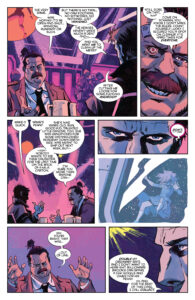 So, I guess what I’m saying is, nothing will just fall into your lap. You have to put yourself out there, make the effort, and most importantly, don’t give up when you hit setbacks. For months, it felt like every day I was making an effort and ending the day feeling discouraged or worthless. But then I’d wake up the next day and do it all over again. Discouragement is part of the process, but persistence is what makes the real difference.
So, I guess what I’m saying is, nothing will just fall into your lap. You have to put yourself out there, make the effort, and most importantly, don’t give up when you hit setbacks. For months, it felt like every day I was making an effort and ending the day feeling discouraged or worthless. But then I’d wake up the next day and do it all over again. Discouragement is part of the process, but persistence is what makes the real difference.
Huge thanks to Cory for taking part in this interview! Missing On The Moon is out next month on the 18th!
Interview by: Rob Wrecks



